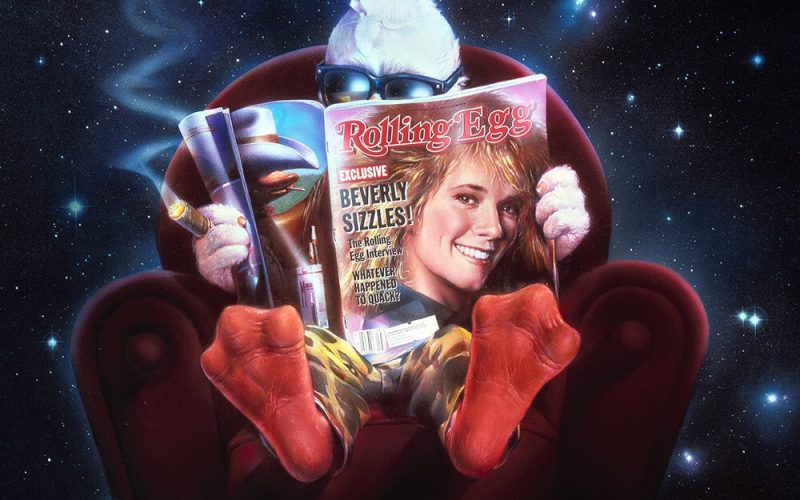In Defense of… Howard The Duck (1986).
*** Editor’s note – The Film ‘89 Team in no way endorses the content of the following article. It’s entirely possible that the author was suffering from some physical or mental illness at the time of writing but even if that’s not the case, we’ve always felt it best to strive to be the type of people who tolerate all opinions, even ones in stark contrast to our own so we’ll allow Steve his say on this most maligned of films! ***
Throughout film history there are movies which can be best described as exercises in folly. In 1916 D.W. Griffith tried to make up for the racism in his epic The Birth Of A Nation with Intolerance, a film which reportedly cost a whopping $2 million. In 1963 the production of Cleopatra finally closed at a cost of $31.1 million which, when you take into account the marketing, would have cost $352 million in today’s money and a whole lot more when adjusted for inflation. The 1980s started with a bang with the release of Michael Cinimo’s Heaven’s Gate, continued with Elaine May’s disaster Ishtar (1987) and closed with the production of Brian De Palma’s Bonfire of the Vanities which was released in 1990.
But while these are all films which spiralled out of control, they were all made based on a foundation of solid ideas. Cleopatra was made at a time when historical epics were box office gold and Elizabeth Taylor was a huge star. The issue was with the production, not the concept. This is true of the other films I’ve mentioned as well.
But there is one film, notorious for being a box office dud, that makes you wonder why, given the talent that conceived it, it was ever produced in the first place.
That apparent fowl-up of epic proportions is, Howard The Duck.
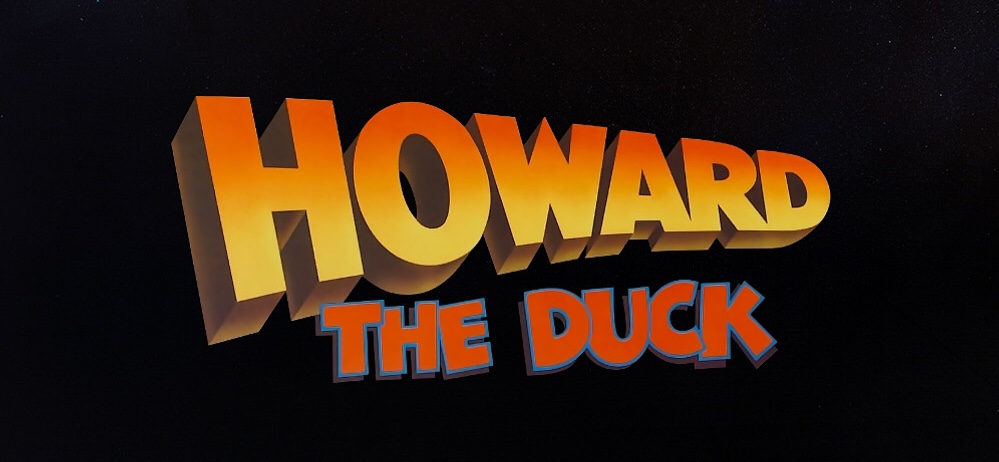
Produced by Universal, who were desperate to work with George Lucas after turning him down a number of times in the past, Howard the Duck is one of those ideas that makes you shake your head. This was the era of the ‘high concept’, when the pitch of a movie was often broken down to one succinct description, which makes you wonder how Universal honcho Sidney Sheinberg could have thought that ‘Alien duck lands on earth and helps fight off an invasion of Lovercraftian monsters’ was a good idea.
The talent behind the film was top notch. First of all there was George Lucas who was riding high on the success of three Star Wars movies and two Indiana Jones films. Lucas had nurtured the idea of turning the Marvel comic into a film since the early ‘70s. It was the story of an alien talking duck that smoked oversized cigars and existed in a film-noir city full of lowlifes and criminals.
Lucas teamed up with two school mates – Wilard Huyck and Gloria Katz – who he’d previously worked with on Indiana Jones and the Temple of Doom. They originally wanted to make Howard The Duck as an animated film, something that may have worked (this would have been even more true in the last decade or so when we’ve had some really wacky animated films, such as Cloudy With A Chance of Meatballs) and had wide appeal, but Universal were looking for a big budget release for the summer blockbuster window. The problem with this is that the niche absurdity of the comic book was then jettisoned in favour of blockbusting action and special effects.
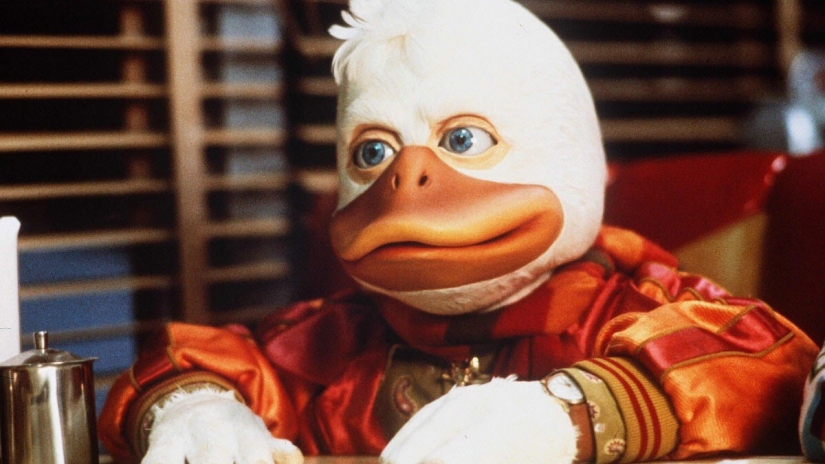
The film starts with Howard, just home from work, relaxing at home with his copy of Playduck, when he gets zapped by a laser and lifted up into the air. He then smashes through his apartment wall, into the neighbours’ – an old couple reading in bed, a naked duck singing in the bath – and then up into the night sky, into space, past various planets until he finally crashes into an alley way in Cleveland, Ohio.
He soon meets and befriends Beverly (Lea Thompson), the lead singer of a struggling all girl group called Cherry Bomb. Beverly takes Howard to see Phil (Tim Robbins), who she believes is a scientist (he’s just a lab assistant). Phil does however, track down the reason for Howard’s journey and, alongside Dr Walter Jenning (Jeffery Jones) they attempt to send Howard back home. Something goes wrong and instead the machine that originally zapped Howard malfunctions and opens a portal for another species to come to earth, the first of which has entered the body of Dr Jenning, slowly taking possession of him. This new alien species, who are straight out of a H.P. Lovecraft novel call themselves the Dark Overlords and they want to take over Earth. It is up to Howard, Beverly and Phil to stop them.
The resulting film was, without a doubt, a disappointment. After the first screening to the Universal top brass, people left the theatre without commenting. There was even a rumour that the heads of Production for the studio, Frank Price and Sidney Sheinberg, had a fist fight in an office as each blamed the other for greenlighting the film. Price left the studio soon after although it was never confirmed whether his departure was directly linked to Howard The Duck.
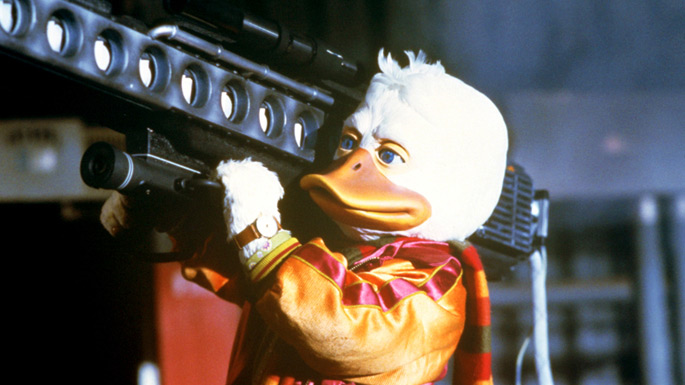
The full cost of the film was $36 million however, worldwide, it only grossed $37 million and it’s failure had a direct impact on the early careers of its cast with both Tim Robbins and Lea Thompson struggling to find work afterwards (although both eventually went on to have fine careers in film and TV). Thompson’s next film was Some Kind Of Wonderful, which she had originally turned down but ended up having no choice but to accept (it was a good thing for Thompson that she did take on the role as she ended up marrying the film’s the director, Howard Deutch).
The reputation of Howard The Duck has not improved in the years since its release and it has never received a decent Blu-Ray release with a remastered print of the film.
So… is Howard The Duck as bad as it’s notorious reputation suggests?
There are obvious flaws which should have been evident at the time of writing. Firstly, the tone is all over the place. Despite George Lucas’s initial attraction to the comic’s ‘absurd noirish atmosphere, very little of this exists. The film doesn’t know whether it wants to be an absurdist comedy or a blockbuster action film, or a subversive farce or the first in a studio franchise. One scene towards the beginning of the film sees Howard getting a job in a filthy and very seedy looking spa where couples make out in the dark. Another infamous scene sees Beverly apparently seducing Howard and, although it turns out that she’s just teasing, it still seems quite odd although, I admit, I’ve never read the comics so these moments may have been in keeping with the original text.
However, besides these moments – and maybe even because of them – Howard The Duck is still very entertaining in its own bizarre way. When it was first released I saw it in the cinema (it had received a name change in the UK and was released as Howard: A New Breed Of Hero) and my younger self came out with a smile on his face. Watching this again, thirty two years later, I was surprised by how many times I laughed.
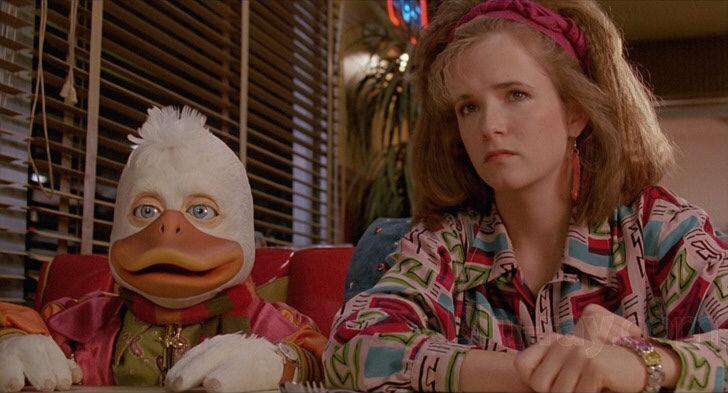
The film has sufficient laughs throughout to be entertaining and, despite the flaws I’ve mentioned, it does at least provide some unique distraction throughout. There are some funny moments and one-liners, many of which come from the relationship between Howard and Beverly – in one scene when a gang of strangers have grabbed Howard with the intent of cooking him, Beverly shouts out ‘He’s my boyfriend!’ The crowd falls silent, turns to her and one of them looks down at her claiming ‘That’s disgusting!’ The look on their faces is worth the price of admission on its own. This relationship is the heart of the film and there seems to be a real sense of affection between the two protagonists and, apart from the one aforementioned ‘seducktion’ (see what I did there?), it’s entirely platonic.
Another source of humour comes from inserting as many duck jokes as possible. Starting in Howard’s apartment on Duckworld, which is lined with posters – Breeders of the Lost Stork anyone? – and throughout, the film is replete with duck references, some that don’t work (he’s a master of Quack Fu) to those that do – ‘Death from the skies to all duck hunters!’ Most of these jokes may result in the viewer rolling their eyes rather than laughing but they are fine for what they are.
The production values are, as you would expect from a 1980s summer blockbuster, egg-cellent (sorry!). This was before the dawn of the CGI era but that makes no difference. Even the stop-motion monster at the end stands up (as long as you accept that it’s of its time). The cinematography is quite great, the editing is spot on, especially in the action scenes. It has a decent western tinged score by John Barry and some fairly catchy songs by Thomas Dolby, performed admirably by Lea Thompson.
Tim Robbins plays it very wacky and Lea Thompson is very likable as the lead. Howard was played by a number of actors, most notably Ed Gale who also played the demonic doll Chucky in the Child’s Play films. His costume isn’t exactly that convincing but is fine and you may soon forget that it’s a man in a suit. During Howard and Phil’s escape on the Ultralight plane, both Robbins and Gale had to fly themselves and in one shot you really do see Robbins’ head being dragged through the water although we would guess that that was filmed in a more controlled environment. Finally, we have Jeffrey Jones, a staple of ‘80s comedy before his eggnominious (again, I am sorry) fall from grace in 2002, who is OTT without ever failing to be entertaining.
Howard The Duck is no masterpiece. It’s not a film that needs re-evaluating as a modern classic that was ahead of its time, however, out of the chaos of its production there is a film in there somewhere which, if accepted for what it is, is at least entertaining. To an adult, even those scenes which seem contradictory to the usual ethos of a big summer movie, may appeal to some with a certain sense of humour. It is over the top, it’s loud and uneven, but there’s a subversive quality to it that works very well.
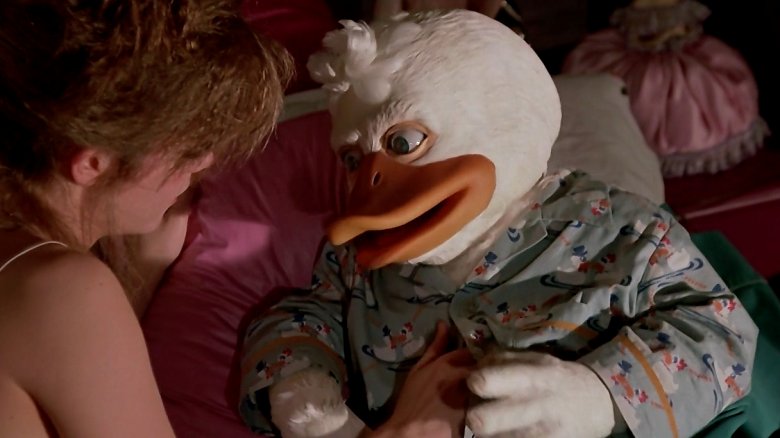
The film critic Mark Kermode, who has been a long time advocate for Howard The Duck, compared it to the Edgar Wright film Scott Pilgrim Vs The World. He said this to highlight the fact that both films are, to those who get them, fun movies with a bit of a subversive edge that help rise them above what they could easily have been. They have been dismissed and, in the case of Howard The Duck, ridiculed, but that doesn’t stop this particular film lover enjoying them.
It does seem that George Lucas may be a bit embarrassed by Howard The Duck but I hope that one day it will receive the full remastered Blu-Ray treatment that, a few of us at least, thinks it deserves. Howard’s recent cameo in Guardians of the Galaxy Vol. 2 bodes well, especially if, as rumours suggest, there’s a new feature-length film to be made in the future. If a really quacking version is released one day, I would certainly pay the (duck) bill! If these admittedly poor duck puns cause feelings of revulsion in you then Howard The Duck may likely not be a film for you. Your enjoyment of it may be largely dependent upon your particular sense of humour and ability to take the film in no way seriously. It isn’t a lost or forgotten masterpiece or some flawed gem waiting to be rediscovered but like any film that’s become famous for being a critical and/or commercial turkey, for whatever reason, it’s at least worthy of re-evaluation and you never know, you might just be one of those in the minority, like me, who actually enjoys it. Maybe!
Howard The Duck is currently available on Netflix (regional variances may apply).

